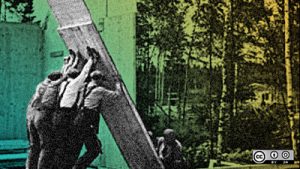Angela DeBarger
Question #4: How do you see your role in the future of open education?
That’s an interesting question because I want to enter with humility in this because in the role that I play as a Program Officer I bring funding to the work but I’m not doing the work. Ideally, I want to create a space where there’s mutual learning happening — where what’s happening in the field is shaping what’s guiding the Foundation and, at the same time, identifying some areas of focus where we think the Foundation can play a role. Hopefully, those areas are ones that are resonant in the field and also helping to create a more expansive field.
The other thing I grapple with is in the early days of Open Education or OER, the Foundation was more in the center of building the field. Now we’re one of many actors, which is a great place to be. I’m trying to navigate that shift. When I think about the role in the future of Open Education, the particular ideas that I hope I can help move forward would be around Open Practice and Pedagogy. I want to work in support for educators around how to engage all of their learners, to incorporate their identities and their experiences into the learning, and to have that collaborative relationship with students. OER is a part of this, but it doesn’t have to be the core of it.
Another area I’d like to hopefully move forward in is around research and understanding how Open Educational Resources and practices can change teaching and learning. We know a little bit about that, and some of the most prominent research is focused on comparing OER classes to non-OER and looking at grades. But I think there are other important elements to consider, including the nuance in terms of what’s possible in interactions in classrooms, and I hope that we can support some research that sheds more light on that. Then when I think about our work with systems, I hope that we’re able to partner with a few educational systems where we really can create the space for Open Education to thrive. I hope we can support the development of sustainable OER initiatives that are really integrated, fully resourced, and supported almost holistically within these systems. What I mean is that it’s not another initiative but it’s something that institutions see as integral to the way that they support teaching and learning. We have some partnerships underway where that’s in-progress, and I really want to do more learning there.

In terms of the field building, I feel we have a role to play in bringing in and bridging to new communities, new organizations, and new teams that can help shape and inform the field, particularly around learning with Black, Indigenous, and Latino communities. That’s something that I think, given our vantage point, that we have at the Foundation, we may be able to help facilitate that. Those are a few thoughts that come to mind but, again, we’ll all be learning together as we see what’s happening in the ecosystem.
